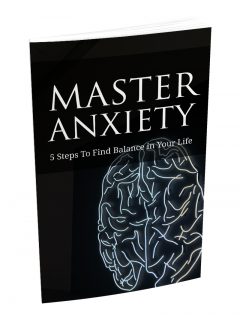 License Type: Master Resell Rights
License Type: Master Resell Rights  File Type: ZIP
File Type: ZIP
 SKU: 63536
SKU: 63536  Shipping: Online Download
Shipping: Online Download
Sample Content Preview
Introduction
Mastering anxiety might not seem like an easy task, but it is possible. Whether it’s a matter of eliminating anxiety or simply managing your stress, you have the opportunity to put in place a plan to deal with everyday anxiety, and you can learn how to overcome anxiety.
To do this, it’s essential to find out what works for you and persevere. The path will not be linear, and it may be a long one. Besides, you will need to be actively involved in your anxiety reduction plan, and not wait for the solution to come only from some medication or an outside person.
At the end of this process, you may still have a small amount of anxiety left over. However, you will be able to live with it! All of this opens up beautiful perspectives and lets you hope for a better life.
Eliminating your anxiety means making sure you get back to everyday life while saying goodbye to anxiety and feelings of uneasiness. The disappearance of the symptoms should not be your main objective, and it should be to eliminate it definitively. It is this difference that will keep you moving forward in the long term. Because yes, overcoming anxiety is a work that requires patience and rigor.
Here are the five steps that will lead you to your goal.
Step 1: Changing Habits
Adopting new habits is critical to start your journey to eliminating anxiety. You will find a few ideas here and feel free to add some of your own.
Adequate Sleep
There’s nothing like a good night of sleep to regulate the mind and the body. Why is sleeping so important for managing anxiety? Because rest has the power to determine your mood. Deep sleep allows you to recover physically, while REM sleep will enable you to assimilate the events of the day and better manage your emotions. A sleep-deprived person tends to be more anxious, more emotional, to anticipate the worst, and to see everything in the dark. It’s a matter of common sense, and researchers have also proven it. Studies show that lack of sleep affects areas of the brain dedicated to the regulation of emotions and promotes anxiety. If you feel exhausted, don’t hesitate to go to bed very early for a few days. If anxiety makes you sleepless, adopt new habits to help you fall asleep. And get back to a good night’s sleep.
Keep a Journal
Even if your anxiety seems to have no particular cause, it often has a trigger. Try to find out what makes you anxious during the day. Get a nice notebook and keep a diary in which you write down your feelings experienced during the day. As the days go by, you will be able to make systematic comparisons between symptoms, intensity, and triggers. The trigger may not necessarily be the root cause of your anxiety, but identifying the trigger will help you trace back your discomfort and better understand your emotions. This diary is a good basis for establishing cause-and-effect relationships, and for starting to work on yourself.
Make Time for Relaxation
If you are feeling very anxious and distressed, do not hesitate to do a breathing exercise, a relaxation technique, or simple stretches. These exercises help you relieve your symptoms and manage your anxiety to the best of your ability! They force you to settle down, calm down, breathe, and oxygenate. Remember that it is important to allow yourself some time to relax during the day, even at work. Learning to breathe is one of the most important things you can do to overcome your anxiety symptoms.
Step 2: Reconnect With Nature
Nature is healing. Being in frequent contact with nature is beneficial in the fight against stress.
Create a Garden
Don’t hesitate to start gardening, whether you live in the country or the city. If you’re an urban dweller, shared urban gardens will allow you to enjoy the joys of nature. You can also create your vertical garden, along a wall, or your tiny garden, in planters, on your balcony or window sill. Some plants can even be grown indoors.
Go for a Walk in the Forest
If you have the opportunity to go for a walk in the woods, you should know that many studies show that walking in the woods has a positive effect on mood disorders. It not only reduces stress and anxiety but also reduces heart rate and systolic pressure. In short, effective anxiety treatment and very natural!
Open a Window
If you wake up feeling anxious, opening a window is your priority! Take the time to open a window as soon as you wake up (or better yet, go out into your garden) and breathe the fresh air, even in winter. Oxygen will help you dissipate your feeling of discomfort and make it easier to face the early morning.
Bring in Nature
Imagine a living environment where everything is “green, calm and pleasure,” a cocoon where you can relax and feel at peace. Your home is the place where you recharge your batteries and prepare to face the outside world. Don’t hesitate to have plants or a green wall that will remind you of nature.
- License: Master Resell Rights
- Category:Ebooks
- Tags:2020 Ebooks With Audio Master Resale Rights








